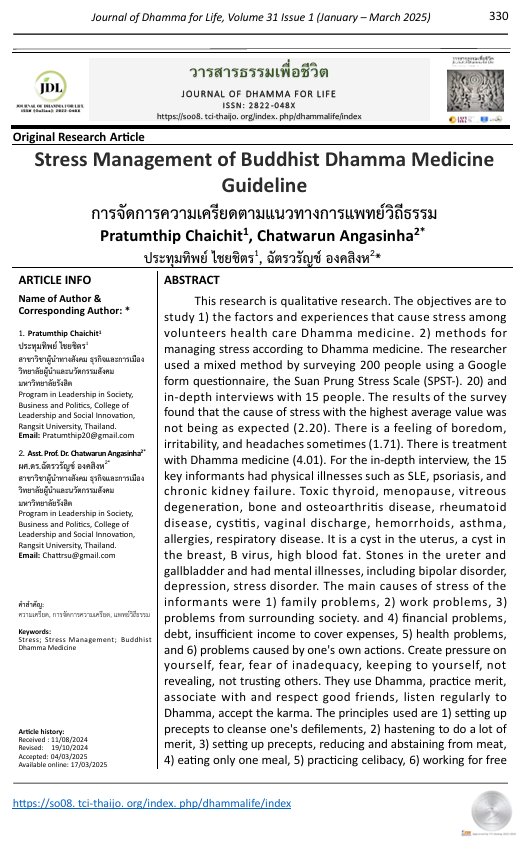Stress Management of Buddhist Dhamma Medicine Guideline
Main Article Content
Abstract
This research is qualitative research. The objectives are to study 1) the factors and experiences that cause stress among volunteers health care Dhamma medicine. 2) methods for managing stress according to Dhamma medicine. The researcher used a mixed method by surveying 200 people using a Google form questionnaire, the Suan Prung Stress Scale (SPST-). 20) and in-depth interviews with 15 people. The results of the survey found that the cause of stress with the highest average value was not being as expected (2.20). There is a feeling of boredom, irritability, and headaches sometimes (1.71). There is treatment with Dhamma medicine (4.01). For the in-depth interview, the 15 key informants had physical illnesses such as SLE, psoriasis, and chronic kidney failure. Toxic thyroid, menopause, vitreous degeneration, bone and osteoarthritis disease, rheumatoid disease, cystitis, vaginal discharge, hemorrhoids, asthma, allergies, respiratory disease. It is a cyst in the uterus, a cyst in the breast, B virus, high blood fat. Stones in the ureter and gallbladder and had mental illnesses, including bipolar disorder, depression, stress disorder. The main causes of stress of the informants were 1) family problems, 2) work problems, 3) problems from surrounding society. and 4) financial problems, debt, insufficient income to cover expenses, 5) health problems, and 6) problems caused by one's own actions. Create pressure on yourself, fear, fear of inadequacy, keeping to yourself, not revealing, not trusting others. They use Dhamma, practice merit, associate with and respect good friends, listen regularly to Dhamma, accept the karma. The principles used are 1) setting up precepts to cleanse one's defilements, 2) hastening to do a lot of merit, 3) setting up precepts, reducing and abstaining from meat, 4) eating only one meal, 5) practicing celibacy, 6) working for free to reduce ego, and practicing self-cleaning. Hold on firmly, 7) let go, reduce, let go of your desires, want to have them, 8) use techniques to get over your illness quickly, don't worry, don't rush the results of your illness, and 9) accept it as it is. Supporting factors to successfully reduce stress It is that the main informant is a Dhamma practitioner, keeping the 5 precepts and refraining from things that are harmful. Practice doing things that are beneficial. To yourself and others, train yourself until you have the knowledge and ability to understand your own mind. Understand the causes of stress Know the nature of the desires that cause suffering and stress. Understanding, then apply them to real life. Until you can reduce stress about various matters.


